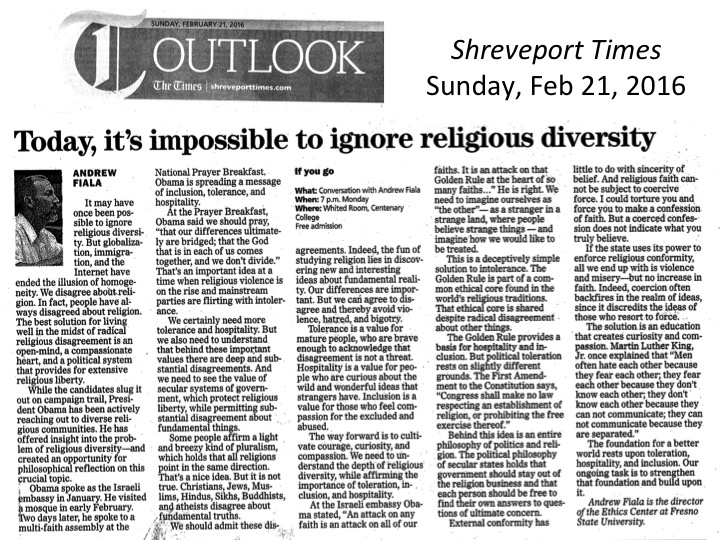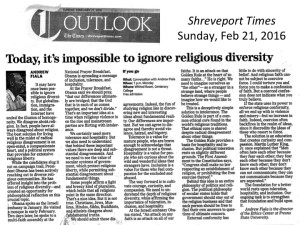DACA controversy reveals conflict between blind justice and broad compassion
Fresno Bee, September 8, 2017
The reconsideration of DACA presents an example of the conflict between justice and compassion. It also shows us the conflict between a narrow conception of our obligations and a broader point of view.
Justice requires impartial application of rules. The goddess of justice is blind. She administers law without considering the identity of those who receive her decisions. Justice is a goddess of the public sphere. She demands that we extend moral concern universally, fairly, and without exception.
Compassion operates differently. The goddess of compassion opens her eyes and her arms. She attends to people’s concrete situations, making exceptions for the disabled, the displaced and the disadvantaged. The motherly goddess of home and hospitality focuses on individual identity and relations of care.
Compassion and justice disagree whenever there is a conflict between mercy and rule-following. Justice requires equal treatment and unbiased judgment. Compassion makes exceptions for special needs and mitigating circumstances.
 The DACA debate asks whether we should extend compassion to the children of immigrants who did not knowingly violate the law when their parents brought them here. Justice may ignore this fact and simply apply a rule that says if you are not here legally, you must leave. Compassion begs us to consider that these young people have no other home to return to and bear no responsibility for their predicament.
The DACA debate asks whether we should extend compassion to the children of immigrants who did not knowingly violate the law when their parents brought them here. Justice may ignore this fact and simply apply a rule that says if you are not here legally, you must leave. Compassion begs us to consider that these young people have no other home to return to and bear no responsibility for their predicament.
President Trump’s statement about DACA uses moral language. But he prioritizes compassion for Americans, saying, “We must also have heart and compassion for unemployed, struggling, and forgotten Americans.” He admits there is something unfair about punishing children for the actions of their parents. But he said that fairness for American citizens was his first priority. He explained, “Before we ask what is fair to illegal immigrants, we must also ask what is fair to American families, students, taxpayers and job seekers.”
Trumpian morality applies compassion and justice in a limited nationalistic way. This fits with the president’s America first agenda.
Moralists have often criticized this kind of nationalism. The goddesses of justice and compassion are not national deities. Morality universalizes.
Justice and compassion extend across borders. The goddess of justice is blind even to national identity claims. And the “mother of exiles” – as the Statue of Liberty has been called – opens her arms to the world’s homeless and huddled masses, yearning to breathe free.
ANY RESOLUTION WILL REQUIRE US TO THINK CAREFULLY ABOUT THE NATURE OF LAW AND MORALITY.
IT WILL ALSO REQUIRE US TO REFLECT ON WHAT IT MEANS TO BE AN AMERICAN.
It is not surprising that American religious leaders responded with dismay to Trump’s announcement. The U.S. Conference of Catholic Bishops condemned Trump’s decision. The bishops wrote, “Today’s actions represent a heartbreaking moment in our history that shows the absence of mercy and good will, and a short-sighted vision for the future.”
Mercy and good will are the heart of the ethics of compassion. The bishops extend this globally, applying the commandment to love one’s neighbor in a universal direction.
Trump and his supporters reject this view of morality. They also discount the religious critique of this policy. Steve Bannon, Trump’s former chief strategist, said that limiting immigration was a matter of “national sovereignty.” He also said that the Catholic church has “an economic interest in unlimited immigration,” suggesting that the church wants immigrants to fill pews and coffers.
The president and his supporters have also claimed that Obama’s Deferred Action for Childhood Arrivals program was unconstitutional. They want Congress to take action. But hundreds of law professors, governors, and other legal and political leaders have argued that DACA is constitutional.
The constitutional question is related to the moral question. Does our legal system require strict impartiality and blind justice or does it permit discretion and compassion? Is the Constitution a system that puts America first and focuses only on questions of national sovereignty? Or are there values in our constitutional system that point in a more cosmopolitan direction?
These are not easy questions to answer. We disagree about religion, morality, and the Constitution itself. These conflicts run so deep that they may never be resolved.
But any resolution will require us to think carefully about the nature of law and morality. It will also require us to reflect on what it means to be an American.
http://www.fresnobee.com/article172036532.html



 President Barack Obama defended Enlightenment values recently in a
President Barack Obama defended Enlightenment values recently in a 
 While the candidates slug it out on campaign trail, President Obama has been actively reaching out to diverse religious communities. He has offered insight into the problem of religious diversity—and created an opportunity for philosophical reflection on this crucial topic.
While the candidates slug it out on campaign trail, President Obama has been actively reaching out to diverse religious communities. He has offered insight into the problem of religious diversity—and created an opportunity for philosophical reflection on this crucial topic.